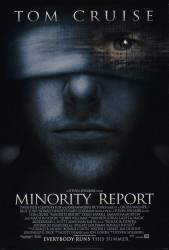Character mistake: Near the end of the movie, John's wife calls one of his colleagues and says, "Jad, it's Laura, John needs a favour." Her character's name is Lara. (02:08:30)

Minority Report (2002)
1 character mistake - chronological order
Directed by: Steven Spielberg
Starring: Tom Cruise, Colin Farrell, Max von Sydow, Neal McDonough, Samantha Morton, Steve Harris
Plot hole: Anderton's wife gains entry into the jailhouse using her husband's eyeball - but he's already locked up inside, so his eye would not still have access to enter as it pleased. Any place anywhere that would have any sort of security system requiring anything from a simple passcode to a card key to a retinal scan, would immediately delete the user in such instances from all rights. And would also certainly report on any attempted use of such (retinal scan, pass code, whatever). (02:00:45)
Iris Hineman: If the unintended consequences of a series of genetic mistakes and science gone haywire can be called 'invention', then yes, I invented Precrime. (00:57:50)
Trivia: The flames in the fire at the end of the film when the camera pans out of the cottage are in the shape of AI, Speilberg's previous film!
Question: OK, let's see: Lamar Burgess set Anderton up; he Hired Leo Crow and sent him to be killed in a hotel. But How did exactly Burgess plan the meeting of Anderton with Crow? Anderton arrived at the crime scene by a chain of events that began with the pre-vision of his destiny. It was clear that Lamar did not fake the pre-vision, because this became true just like it was predicted; besides, when Anderton was being chased, he arrived to crime scene by a coincidence; so what did Burguess have to do to make sure the existence of the pre-vision and this possible future? I don't see a simple solution.
Answer: Well, there isn't really a simple solution, but here goes. For a pre-vision to form, there have be two things present within the range of the precog ability (which appears to be limited to the Washington area - regardless of the stated plan to take the programme countrywide, there's never any indication that the precogs can sense beyond that range). Firstly, someone with the intent to kill. Secondly, there has to be a target for that intent within the range of the precogs. Anderton is present, and has the intent within him to kill the man who took his son, but has no target - the real kidnapper is presumably either dead or beyond the precog ability. Burgess, by bribing Crow to pretend to be that man, has provided a viable target for Anderton's intent within the range of the precog ability, thus triggering the prevision, and beginning the chain of events.
The above answers the question, but there do appear to be some time travel issues with this plot point in the movie. Burgess set things up for Crow to fake being the kidnapper and thus triggering Jon's desire to kill that person, everything starts by the pre-cogs seeing the future. If the pre-cogs did not exist or did not have the vision, Jon would have never known that Leo Crow existed and would have continued on without having killed anyone. This is unique within the movie, as the other murders would have been commited regardless of whether or not the pre-cogs saw it. In this case, the ONLY reason this murder occurred is because the pre-cogs saw it.
Thinking about this a little more, it could be conceivable that Burgess had planned a different option for Jon finding Crow. We just never saw that on screen, because the precogs changed everything to an alternative future timeline once they saw the original murder. Originally, Jon could have been triggered by Burgess himself, stating that they got a lead on his son's murder and pointing him to Crow.
No I think Burgess set it up so that Anderton would find Crow because of the precogs, not have a different plan set up before or else it could be possible Burgess himself would be visible in the prevision. He manipulated the system perfectly, he has done it before after all. He knows exactly how the precogs work so he is able to set it up so that it's untraceable. Except, except for the fact there is always a choice. Only then did it go wrong for him. This proves both true for Anderton and Burgess in the end.
Join the mailing list
Separate from membership, this is to get updates about mistakes in recent releases. Addresses are not passed on to any third party, and are used solely for direct communication from this site. You can unsubscribe at any time.
Check out the mistake & trivia books, on Kindle and in paperback.




Suggested correction: I thought that this was a mistake as soon as I saw it on screen, but reconsidered. It's perfectly possible that there was some, probably human caused, delay in updating the security system. After all, there wasn't a rush to do it since they already had the chief on ice. Maybe the sleep jail was still on a legacy system without automatic updating. Just assuming that in the near future that all systems are all perfectly integrated and instantaneous does not validate this as a mistake.